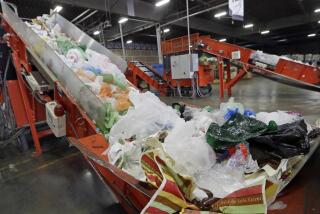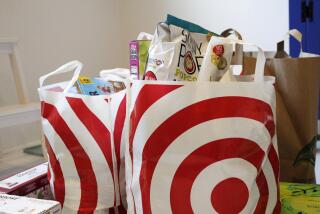New Yorkers Slow to Bag Wasteful Habits
NEW YORK — At a D’Agostino’s supermarket checkout on the Upper West Side, cashiers hand out grocery bags with little thought about waste. Everything is bagged--from a full week’s shopping in a plastic carryall to a can of soda shrouded in a paper bag.
Cashiers want to move lines; customers just want to get out. “I’m just happy to make it home with bags intact,” said one overburdened shopper. And environmental concerns are lost in the rush.
Americans use an estimated 38 billion shopping bags yearly, 60% plastic and 40% paper. While recycling paper has been common for years, recycling plastic grocery bags is now becoming more widespread. More than 17,000 of the country’s 31,000 supermarkets now offer collection and recycling programs, according to the Washington-based Plastic Bag Information Clearing House, a group sponsored by the Plastic Bag Assn.
Collected bags can be recycled for use in making landscape timbers, signposts, speed bumps, traffic cones, trash cans, detergent bottles and new trash and grocery bags. Other store schemes include paying customers a dime to reuse their old bags and suggesting that buyers use canvas or mesh tote bags.
But it has yet to catch on in Manhattan. The consumer capital--lacking space or, perhaps, customer and store willpower--lags behind the rest of the nation in dealing with this waste.
Only some branches of Food Emporium offer shoppers recycling facilities. Existing recycling efforts, such as producing leaflets for customers, are token, at best, and have not been a city priority. Mary Moore, director of public affairs for D’Agostino Supermarkets, conceded that the company’s bagging guidelines have been buried under other recent store campaigns. Moore said that cashiers are supposed to ask customers whether they have their own bags or whether they want paper or plastic. “The company’s policy is to use only one bag. If customers ask for double bags, we give them.”
Supermarkets face a number of difficulties in getting customers to recycle plastic grocery bags, Moore said.
“One big problem is that if we put bins in our supermarkets we will get bags from all over the city that may not be clean or empty, and we have to sort them out into ones that can be recycled,” she said. Environmental groups also acknowledge that contamination of the bags can be a problem.
Several Manhattan supermarkets say they are looking into alternatives and some are considering offering rebates.
“New York is way behind other parts of the country because the city was way too ambitious in the first place with it recycling scheme. It tried to do too much too fast. We are dealing with a complicated city,” Moore said.
Pat Broadhagen, director of public and consumer affairs of the New York State Food Merchants Assn., said: “The move is to reduce the number of bags altogether to reduce the waste stream. It has been a lot slower coming to New York City because there are so many independents.”
Unlike the chain stores, the independents cannot afford the warehouses and trucks needed to transport the waste, she said.
“We would like to do more in the city and are trying to find ways to improve the situation,” Broadhagen said. “We are changing attitudes slowly, but in our business the customer is always right.”
And customer habits change slowly. “New York’s just the consumer capital of the world and consumers here cherish disposability,” said Ken Scott, a researcher for the Council on Economic Priorities, a nonprofit public interest research group.
Environmental groups claim that the city lacks leadership in the recycling area and that grocers have been slow to act. “For the supermarkets, it is a convenience issue. The costs of bags is included in the price of groceries and they don’t want to charge people extra,” said Alicia Culver, a research associate at the Center for Biology of Natural Systems, an environmental research institute associated with Queens College.
“We would prefer that customers use reusable canvas or string bags,” Culver said. Her second choice: the old-fashioned paper bag.
More to Read
Sign up for Essential California
The most important California stories and recommendations in your inbox every morning.
You may occasionally receive promotional content from the Los Angeles Times.










